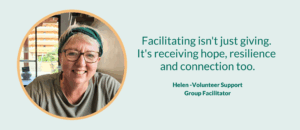As a carer you may become annoyed when anxiety strikes. “I don’t have time to have an anxiety attack right now”, “of COURSE this has to happen now, I’m meant to be doing something for my loved one” or “I am so sick of these anxious moments, I wish they would just go away”.
When anxiety pays us a visit, it brings with it a sense of doom. Our hearts race, our minds get busy concocting all different awful scenarios, our breathing becomes shallow and we can sometimes feel light-headed. Suffering anxiety is not fun. If you suffer anxiety, you know this to be true.
Whatever the trigger may be, we suddenly find ourselves cocooned in a storm of feelings that nobody else can see. Whether you’re at work at your desk, or frozen at the kitchen sink, or standing at a set of lights – your stillness contradicts everything that is going on within your mind at that moment.
What To Do
The fabulous world of the internet shows us that there are a multitude of ways to deal with anxiety. But for us, we wanted to share with you an activity that involves using your five senses and is often referred to as the ‘5-4-3-2-1 coping technique’.
This technique is designed specifically to be easy to implement and effective in drawing your attention to this moment. It helps to calm your breath, settle your thoughts and brings your mindfulness to the present.
Let Your 5 Senses Ground You
To get started, take in a big breath from your belly:
5. See – Look around you and find five things you can see.
4. Feel – Notice four things that you can feel eg your feet in your shoes, the itch in your arm, the clothes against your skin.
3. Hear – Take note of three things you can hear. Traffic outside, the wind in the trees or your neighbours’ dog.
2. Smell – Breathe in and list two things you can smell.
1. Taste – List one thing you can taste.
Some articles will recommend that you say all these things out loud in acknowledgment. This will obviously depend on where you are, and if you’re out in public it’s probably enough for you to acknowledge them silently, to yourself.
Want To Know More?
If you like this activity and would like to find other grounding activities, you can find a variety of choices if you search for the term “anxiety grounding tool” on the internet.
Arafmi Ltd is a not for profit community organisation that has been providing quality services to the Queensland community for over 40 years. Our focus is to enhance the wellbeing of people with mental illness, their families, carers and volunteers.



